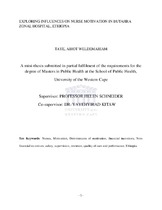| dc.description.abstract | Background: Low motivation, defined as an individual's lack of willingness to maintain and exerteffort to attain organizational goals, is a problem in Ethiopia. Its consequences are poor quality of health care or performance, lack of retention and inequity. This study explored influences on nurse motivation in Butajira Zonal Hospital (BZH), and specifically investigated the influences of financial and non-financial incentives on nurses' motivation at work. Methods: A qualitative methodology, consisting of both in-depth interview and focus group discussion (FGDs) data collection methods was adopted. The study population was all nurses working at BZH with more than two years of experience, from which a sample of fifteen nurses(representing a balance of age, gender and category) was purposefully selected. Following informed consent, these fifteen nurses were interviewed by the investigator, and were followed in a second stage by three focus group discussions; with six participants each (total eighteen). Both the interviews and the discussions were conducted mostly in Amharic and tape recorded, transcribed and translated by the researcher. The data was analysed using thematic analysis. After reading, transcriptions were coded in informants' own words and phrases. These were examined, categorised and consistent themes identified and then coded with keywords to represent the content,which were considered to constitute the 'emerging themes'. Findings: In both the FGDs and interviews, a number of key themes were identified relating to both nurses' self-reported motivation and the factors influencing this at BZH. Altruism and professional pride ('love of the profession') as a source of intrinsic motivation emerged as a key theme, counterbalanced by a perception of nursing as having significant job risks (e.g. contracting infections from patients). With respect to financial incentives, salaries too low to meet living costs, unfair taxation on overtime payments, and the absence of a salary grading system for nurses was all raised as negative influences on motivation. While team spirit and solidarity amongst nurses was a positive feature of the work environment, relationships between doctors and nurses were described as poor, aggravated by large salary differentials, and perceived indifference of management to nurses. Other non-financial incentives– training, recognition systems, supervision and workplace conditions– had mixed influences on motivation at BZH. Finally, personal factors, such as age, gender and origin or married in the region,influenced reported motivation. Conclusions and Recommendations: The Ethiopian health system has paid great attention to increasing numbers, expanding training of, and creating specializations for, nurses. However, less attention has been given to their working conditions and the appropriate package of financial and non-financial incentives that will sustain performance and retention. These need to be addressed at the hospital itself, at higher levels of the system and at a broader policy level. Managing motivation requires keeping a broad perspective and innovative approaches that address the range of influences identified in the study. Solutions should be context based and sensitive to influences beyond the commonly understood sources of motivation. | en_US |

